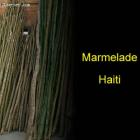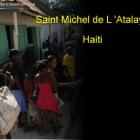ADVERTISEMENT
Francois Duvalier - Haiti Observer Blog
Francois Duvalier, Haiti Observer Blog. Read the following articles about Francois Duvalier
Francois Duvalier, Minister of Public Health under Dumarsais Estime
Francois Duvalier who was appointed under the government of Estime, joined the government of President Dumarsais Estime, becoming director general of the national public health service. In 1948 he is appointed as minister of public health and labor.
After the military coup that overthrown the Estime regime on 10 May. 1950, Duvalier returns to his medical career. However, quietly and behind the scenes he begins organizing against the military regime that was in place then. By 1954 he is the central opposition figure and goes underground, hiding inside of the country.
The election of Dumarsais Estime represented a break with the traditional Haitian politic at the time. For one, he was anti-elitist and therefore generally anti Mulatto. The constitution was changed and came into effect in November 1946. He increased the representation of middle-class and lower-class blacks in the public sector and suggested that voodoo be considered as a religion equivalent to Roman Catholicism
Dumarsais Estime, Paul Magloire and Francois Duvalier shaped Haiti
Here is a picture of three major players in the history of haiti: Dumarsais Estime, Paul Magloire and Francois Duvalier
Dumarsais Estime came into power in haiti following a seven-month period of political wrangling. His administration was marked by confrontation with the American government.
The Noiriste government of Dumarsais Estime was noticed by many in the international community. Most Government jobs during his administration, specifically cabinet positions, were reserved for black professionals instead of members of the Mulato elite.
Focus was also on education where he built many provincial schools and expanded training for teachers
Francois Duvalier Reign in Haiti
Francois Duvalier, 40th President of Haiti, began life in Port-au-Prince. Born to a well-to-do family, he earned a medical degree from the University of Haiti. After serving as a political appointee under President Estimé, he ran for the presidency under a populist platform that won support from the Afro-Haitian electorate. He won and began his rule of tyranny, manipulating the Constitution to declare himself "President for Life".
Francois Duvalier tolerated no opposition to his repressive policies. He intimidated his enemies, routinely ordering assassinations, an estimated 30,000 of them. Many educated Haitians fled Haiti, and the island has never recovered its intelligentsia.
Daniel Fignole a Brilliant Labor Leader
Daniel Fignole, born in 1913 in Pestel and raised in grinding poverty, suffered from childhood malnutrition. To escape the poverty of his birthplace, Daniel re-settled in Port-au-Prince and sought an education. He proved to be an excellent student, winning acceptance to a top-tier university in the capital.
During the early 1940s, Daniel Fignole published the leftist, Chantiers, in which he harshly criticized the mulatto elite of Haiti. President Elié Lescot, provoked by Fignolé's attacks, stopped the publication, axed him from his government job, and spied on him.
Indifferent to government actions, Daniel Fignole kept organizing the working-class of Port-au-Prince. They became aware of him as an electrifying orator, motivational writer, and powerful labor leader. It was rumored he could rally mass demonstrations at a moment's notice. In 1947, he headed the Peasant Worker Movement, a tight-knit union comprised of every labor sector.
A Brief History of Haiti Constitution
The government of Haiti GOH) has passed almost as many constitutions as it has survived coup d'etats. Haiti's current Constitution, passed in 2012, is the 23rd one written into law.
The first Constitution of Saint-Domingue in 1801 appointed General Toussaint L'Ouverture as ruler for life. It also put an end to slavery, democratized hiring practices, and prohibited all religions except Catholicism. The 1805 Constitution allowed all forms of religious faith and approved reverse-race discrimination, calling all citizens black. The 1807 Constitution removed the reverse-race discrimination clause.
In 1816, the 1806 Constitution was revived, declaring President Alexandre Pétion President for Life. It also gave him unilateral power over Parliament. But under Jean-Baptiste Riché, the 1816 Constitution was put into effect again.
Colonel Octave Cayard, Commandant of the Haitian Coast
Colonel Octave Cayard, on the morning of April 24, 1970, led a section of the Haitian Coast Guard into a rebellion against the Duvalier government and a naval attack on Port-au-Prince. In a United States memorandum sent to Washington, the event was chronicled by Viron P. Vaky, who wrote that the revolting guards had acted in desperation after those plotting a coup against the then president, Cayard included, had gotten wind that the controversial leader was in pursuit of them.
At 9am Colonel Octave Cayard declared in a telephone call that he would capture the Coast Guard's largest vessels. By sixteen minutes to twelve a round was fired, but landed short of the Palace. Though a subsequent ten rounds were fired, Vaky reported that things were 'reasonably calm' and that there was no sign of additional forces joining the erstwhile rebellion as ground troops appeared patriotic to the government.
Role, Term of Haitian Presidents from Haiti Independence to 2013
The Haitian government is led by a president, who shares his/her executive power with the prime minister. Once elected by popular vote, the president will run the country for five years. After the term, the president could not run in the next election. He/she has to wait for five years in order to seek a second term. Haiti presidents can only serve for a maximum of two terms.
Not everyone can run for president as there are certain qualifications and requirements to be eligible for the seat. Only candidates with Haitian citizenship by birth can run for the position, as well as those who are at least 35 years of age. Jail sentence, loss of civil rights and lack of property ownership and residency can make a candidate ineligible to assume the position.
The Town of Cabaret and its Challenges
Life has not been easy for people living in Cabaret, which is one of the two towns forming the Arrondissement of Arcahaie in the Ouest Department. About 63,450 people are residing in the town and for the past years, they have faced a lot of challenges, including deaths and calamities.
In 2010, Haiti has been hit by a devastating earthquake that killed tens of thousands of people. In relation with this, Cabaret has witnessed the deadly impact of the calamity as it served as mass graves for the victims. Outside Titanyen, which is one of the settlements in Cabaret, mass graves were dug for the victims of the earthquake. Some parts of the fields were chosen so as to have a place to lay the victims to rest.
Carnival Music Politics Provoke Government of Haiti Response
Haiti's Carnival has a dark side when it comes to music played during its annual celebration . At the festival, revelers respond to messages contained within song lyrics, and what they suggest sometimes makes the government of Haiti (GOH) uneasy. Some songs encourage festival celebrants to act out their resentment at the GOH.
During Carnival '97, the monster hit of music group Koudjay, "Si Yo Vle", urged Haitians to hang amoral politicians then in power. In response, many symbolic hangmen's nooses whirled above the crowd. Although the GOH refrained from commenting on the song, they responded with a direct show of force. Forty SWAT officers were deployed to brandish their semi-automatic rifles at the crowd with gestures that intended serious injury.
Haitian President Francois Duvalier
The early years of independent politics in Haiti are marked by coup d'états and violence as several powerful political leaders clash for total control over the country. One of these notorious figures in this era of political turmoil is François Duvalier, more popularly known as "Papa Doc".
Francois Duvalier was Haiti's president for fourteen years from 1957 until his death in 1971. Before becoming the country's most powerful man, he was a physician in local hospitals and communities in the country where he treated the poor from infectious tropical diseases such as malaria and typhus. With his recollection of brutal political conflicts happening in Haiti during his time, Francois Duvalier was inspired to enter the world of politics. He was selected by then President Dumarsais Estimé as the National Public Health Service's Director General.
Our objective is to share with you news and information about Haiti and the people of Haiti. Traditions, habits and the way we were or grew are alive in this site. We highly recommend that you Subscribe to our Newsletter and also share with us some of the things that are memorable and made us unique people.

 Marmelade, Haiti
Marmelade, Haiti  Saint Michel de L 'Atalaye
Saint Michel de L 'Atalaye  Thomonde, Haiti
Thomonde, Haiti  Something to think about
Something to think about  Life After Death
Life After Death